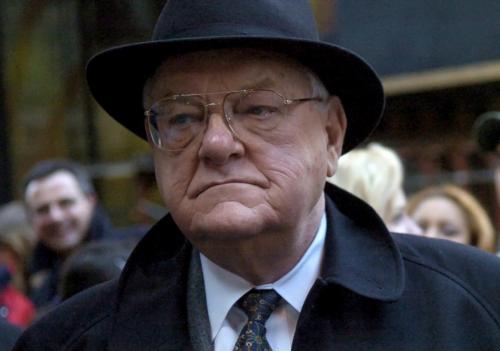04 May 2025 :
May 2, 2025 - Illinois. Former Illinois Gov. George Ryan Dies at 91
Ryan, disgraced by a corruption scandal that landed him in prison, was yet heralded by some for clearing the state’s death row.
Robert Gessner, a family friend, said Ryan died Friday afternoon at his home, where he was receiving hospice care.
Ryan started out a small-town pharmacist but wound up running one of the country’s largest states. Along the way, the tough-on-crime Republican experienced a conversion on the death penalty and won international praise by halting executions as governor and, eventually, emptying death row.
He served only one term as governor, from 1999 to 2003, that ended amid accusations he used government offices to reward friends, win elections and hide corruption that played a role in the fiery deaths of six children. Eventually, Ryan was convicted of corruption charges and sentenced to 6½ years in federal prison.
In a 2020 interview with WTTW News, Ryan recounted what he said were his reasons for pausing the state’s death penalty.
Soon after he took office in 1999, journalism professors and students from Northwestern University helped exonerate Anthony Porter following a wrongful conviction for a 1982 double murder. Porter spent more than 15 years in prison before his innocence was proven.
The case rattled Ryan.
“I was sitting in the mansion, watching the news from Chicago on the television when I look up and here’s little Anthony Porter coming out with a big grin on his face after spending 16 years on death row only to be found innocent of his charges,” Ryan told WTTW News in 2020. “And I said to my wife, ‘How does that happen in America?’ Put a fella on death row for 16 years and he wakes up every morning and says, ‘I wonder if today is the day they’re gonna throw the switch on me.’”
But his actions as governor were quickly overshadowed by his trial and conviction.
During his more than 5 years behind bars, Ryan worked as a carpenter and befriended fellow inmates, many of whom addressed him as “governor.” He was released in January 2013, weeks before his 79th birthday, looking thinner and more subdued.
He’d been defiant heading to prison. The night before he went in, Ryan insisted he was innocent and would prove it. But when Ryan asked President George W. Bush to grant him clemency in 2008, he said he accepted the verdict against him and felt “deep shame.”
“I apologize to the people of Illinois for my conduct,” Ryan said at the time.
Ryan was still serving his sentence when his wife, Lura Lynn, died in June 2011. He was briefly released to be at her deathbed but wasn’t allowed to attend her funeral. On the day he left prison and returned to the Kankakee home where he and his wife had raised their children, one of his grandchildren handed him an urn containing his wife’s ashes.
In that 2020 interview with WTTW News, Ryan was asked what he hoped his legacy would be. He said he would leave that to historians but pointed to a book he recently co-authored on capital punishment and its message.
“There’s still 28 states that have the death penalty, plus the United States,” Ryan said in 2020. “We gotta do away with the death penalty; it’s not a deterrent in any fashion and it’s just kind of barbaric.”
Born in Iowa and raised in Kankakee, Ryan married his high school sweetheart, followed his father in becoming a pharmacist and had 6 children. Those who knew Ryan described him as the ultimate family man and a neighbor’s neighbor, someone who let local kids use his basketball court or rushed to Dairy Queen to buy treats when they missed the ice cream truck.
“He’s even offered to deliver the papers,” newspaper delivery boy Ben Angelo said when Ryan was running for governor. “He was serious.”
In 1968, Ryan was appointed to fill an unexpired term on the county board, beginning a quick rise in politics. Eventually, he served as speaker of the Illinois House, lieutenant governor, secretary of state and, finally, governor.
A glad-handing politician from the old school, Ryan emphasized pragmatism over ideology. He worked with officials from both parties and struck deals on the golf course or during evenings of cigars and booze.
Ryan helped block the Equal Rights Amendment in the early 1980s during his term as speaker of the Illinois House, triggering some of the most heated demonstrations ever seen at the Capitol.
“They wrote my name in blood on the floor in front of the House, in front of the governor’s office,” Ryan said. “They were trying, hectic times, frankly.”
His willingness to set aside party orthodoxy sometimes put him at odds with more conservative Republicans. He became the 1st governor to visit Cuba since Fidel Castro took power. And in 2000, after signing off on the execution of one killer, he decided not to carry out any more. He imposed a moratorium on executions and began reviewing reforms to a judicial system that repeatedly sentenced innocent men to die.
Ultimately, Ryan decided no reforms would provide the certainty he wanted. In virtually his last act as governor, he emptied death row with pardons and commutations in 2003.
“Because the Illinois death penalty system is arbitrary and capricious — and therefore immoral — I no longer shall tinker with the machinery of death,” Ryan said.
Ryan found himself nominated six times for the Nobel Peace Prize just as federal prosecutors were closing in on him.
Much of the illegal activity took place during Ryan's two terms as Illinois Secretary of State, including the deaths of six children in 1994. The children were burned to death after their minivan collided with a piece of debris that had fallen from a truck whose driver had obtained his license from the truck licensing office, whose top officials had been appointed by Ryan. Investigations found that the truck driver responsible for the accident was not in compliance with all legal requirements but had nevertheless obtained his license through a “kickback.”
Federal investigators, followed by judges, concluded that the “kickback” system at the motor vehicle office was “ordered from above” and served to raise funds for election campaigns.
On May 15, 2006, after a six-month trial and 11 days of deliberation, a federal jury found Ryan guilty on all 18 counts brought against him by the prosecution, and Judge Rebecca Pallmeyer sentenced him to six and a half years in prison. Ryan appealed, but his appeal was rejected by the Court of Appeals. On November 7, 2007, Ryan turned himself in and was granted parole on January 23, 2013 (with the obligation to reside in a Salvation Army facility). He was released from prison on July 3, 2013, and also completed his additional sentence of “federal supervision” on July 3, 2014.
On July 8, 2015, Ryan announced that he had founded Abolition Now, a non-profit organization dedicated to the abolition of the death penalty in the United States. In an interview at the time, he said: “Years ago, I was accused of using my opposition to the death penalty to divert attention from the fact that I was under investigation for corruption. “Life is what you're given, and you have to make the best of it and keep going.” ”But I've always intended to fight against the death penalty, and our organization has just received tax-exempt status from the state for donations, which will help us. Now we are waiting for the same authorization to be granted at the federal level.” ”I am now a great-grandfather and spend a lot of time with my family. I have almost finished my book, which is a kind of biography, but focuses mainly on my political career and my trial. Life is beautiful, but it should also be fair.”
Ryan was Honorary President of Hands off Cain for a long time, even during his period of detention. On the Ryan case, see also HoC 15/05/2001; 18/08/2001; 08/02/2002; 02/03/2002; 14/03/2002; 04/12/2002; 05/12/2002; 11/01/ 2003; 14/06/2003; 17/07/2003; 16/09/2003; 02/10/2003; 19/11/2003; 20/01/2004; 22/01/2004; 15/05/2006 ; 11/29/2006; 08/21/2007; 11/07/2007; 02/03/2008; 01/06/2010; 01/23/2013; 07/03/2013; 07/03/2014; 08 /07/2015.











